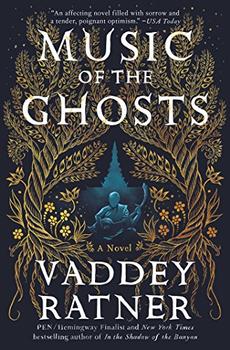Summary | Excerpt | Reading Guide | Discuss | Reviews | Beyond the Book | Readalikes | Genres & Themes | Author Bio

He closes both eyes, for the effort of keeping them open has begun to strain the muscles and nerves of the right one, as if the left eye, unaware of its uselessness, its compromised existence, continues to strive as the right eye does. Sometimes he thinks this is the sum of his predicament: he is dead but his body has yet to be aware of his death.
He reaches into the pocket of his cotton tunic hanging on a bamboo peg above his pillow and withdraws a cone-shaped plectrum made to put over the fingertip. In the old days, this would be crafted from bronze or, if one was a wealthy enough musician, from silver or gold. But this plectrum is fashioned out of a recycled bullet casing. Art from war, said Narunn, the man who gave it to him, a doctor who treats the poor and sometimes victims of violence and torture; who, upon examining his eyes, informed him that the cataract covering his left pupil was caused by untreated "hyphema." An English word, the Old Musician noted. A medical term. A vision clouded by spilled blood. Or as the young doctor explained, Hemorrhaging in the front of your eye, between the cornea and the iris. Caused by blunt trauma. I believe yours happened at a time when there was no means of treatment. The doctor did not inquire what might've been the source of the trauma, as if the lesions and scars on the Old Musician intimated the blunt force of ideology, that politics is not mere rhetoric in this place of wars and revolutions and violent coups but a bludgeon with which to forge one's destiny.
Indeed the doctor was kind enough not to interrogate. Instead he revealed to the Old Musician that the brass plectrum was made by a young woman who'd lost half her face in an acid attack, who worked to reconstruct her life, if not her visage, by learning to make jewelry in a rehabilitation program for the maimed and the handicapped. Hope is a kind of jewel, don't you think? his young friend pondered aloud. At once metal-hard and malleable...
Certainly it is the only recyclable currency, the Old Musician thinks, in a country where chaos can suddenly descend and everything, including human life, loses all value.
He places the plectrum over the tip of the ring finger of his right hand, the brass heavy and cool against his nailless skin. It refuses to grow back, the nail of this one finger, the lunula destroyed, a moon permanently obliterated by one smash of his interrogator's pistol. The other fingernails are thick and deformed, some filling only half of the nail beds. He's often surprised that he can still feel with these digits, as if the njuries they sustained decades ago heighten their wariness of contact, sabotage.
He tilts the sadiev so that it lies diagonally across his torso, the open side of the cut-gourd sound box now covering the area of his chest where his heartbeats are most pronounced, its domed chamber capturing his every tremor and stirring.
Ksae diev, some call it. He dislikes it, the harshness of the ks against his throat, as if the solidity of the first consonant pressed against the evanescence of the second inevitably leads to a betrayal of sound. He much prefers sadiev, the syllables melting into each other so that it's barely a whisper, delicate and fleeting, much like the echo it produces.
Eyes still closed, he takes a deep breath as he would before every performance, diving past the noise in his head, the surging memories, his plagued conscience, until he reaches only silence. Then tenderly, with the ring finger of his right hand, the brass plectrum securely in place, he begins to pluck the lower part of the string, while higher up the fingers of his left weave an intricate dance. He plays the song he wrote for his daughter, upon her entry into his world, into his solitary existence as a musician. I thought I was alone. I walked the universe, looking for another... He remembers the day he brought her home from the hospital, her breath so tenuous still that he wanted to buttress it with notes and words. I came upon a reflection... and saw you standing at the fringes of my dream.
From MUSIC OF THE GHOSTS by Vaddey Ratner. Copyright c 2017 by Vaddey Ratner. Reprinted by permission of Touchstone, an Imprint of Simon & Schuster, Inc.
Your guide toexceptional books
BookBrowse seeks out and recommends the best in contemporary fiction and nonfiction—books that not only engage and entertain but also deepen our understanding of ourselves and the world around us.